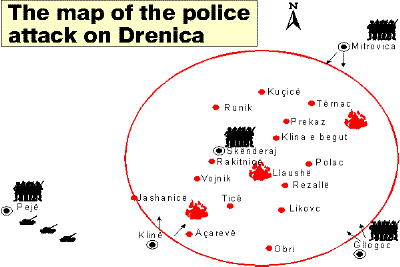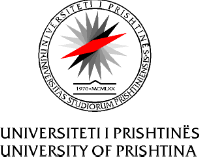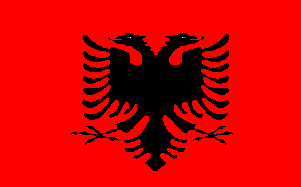Kosovo - Kosova Crisis |
So, if Bosnian Muslims and Kosovo Albanians volunteered to abandon their homes and possessions, rubber-stamping the Serbian policies of "ethnic cleansing," their lives would be generously spared.
"Solution lies in dialogue," said the boss of above-mentioned police major. Doesn't this sound all too familiar, too? Serbian interior ministry reports 200 terrorist attacks since 1991 on Kosovo. However, the UCK (KLA: Kosovo Liberation Army) is around only for somewhat more than a year - benefiting mostly from a spin-off of smuggled AK rifles and other weapons looted from Albanian military during the recent upheavals in Albania (650,000 rifles were looted), and the Serb's loss of the Drenica region to KLA is just a few months old. Actually, Kosovo Albanian leaders shunned from armed struggle hoping for and continuously asking for dialogue in the past ten years. One of the reasons why Ibrahim Rugova, the leader of largest political bloc among Kosovo Albanians, lost so much support among his people lately, is his stubborn adherence to dialogue. As it did in Bosnia, Serbian regime again declares it's willingness for a dialogue, while in reality blocks any initiative that could lead to one. Fehmi Agani, one of the leading Albanian cause spokesmen said for B92 that the sudden Serbian government call for a dialogue, after they massacred women and children, is unearnest.
 As they claimed in Bosnia that Bosnian Muslims shelled Sarajevo themselves, I've just heard Yugoslav ambassador in Zagreb saying that Kosovo kids were killed by Kosovo terorist leaders not wanting them to escape and
give their positions. Other events confirm the use of the same tactics that Serbia used in Bosnian and Croatian wars:
As they claimed in Bosnia that Bosnian Muslims shelled Sarajevo themselves, I've just heard Yugoslav ambassador in Zagreb saying that Kosovo kids were killed by Kosovo terorist leaders not wanting them to escape and
give their positions. Other events confirm the use of the same tactics that Serbia used in Bosnian and Croatian wars:
- Serbs again refuse to let international humanitarian organizations (as reported by ICRC) through to help care about refugees and displaced persons,
- they refuse international mediation (Albanian leader Azem Vlassi suggested European envoy Felipe Gonzales) in the dialogue and
- they disallow peaceful protests as they turned away Prishtina women that attempted a march on Drenica carrying a loaf of bread each.
In fact, nobody in Serbian government and, which is more sad, in Serbian political opposition, ever seriously thought about opening a dialogue with Kosovo Albanians. After all, neither did Russians ever consider a dialogue with Chechens, nor had the French been willing to accept a dialogue with Algerians, while Brits just recently, and only under the U.S. pressure, sat at the same table with Shin Fein's Garry Adams. Serbia behave as any other colonial power, which made Albanians in Kosovo learn their lesson: dialogue is futile. Nobody would listen to their case until the world media started reporting on the existence of KLA.
European powers are poorly equipped to deal with this crisis: Russians do not want to see Kosovo in Albanian hands, because that would spark a precedent for the situation in Chechenya; England perhaps see the similarity between KLA and IRA; France didn't give up Algeria without a fight, so it should show some understanding for Serbia today. In fact, currently the Serbian minority in Kosovo is smaller than French minority was in Algeria before that war, that France defended in front of the world community as the "internal French question." Doesn't that sound awfully familiar, too?
European powers reluctance to act against the fellow colonialist power already created one very bloody debacle for the international community: Bosnia. It is, therefore, imperative now, in the case of Kosovo, to act immediately and preventively. Check here the latest from State Department, U.S Congress and Contact Group on that issue. Human Rights Watch suggested that International War Crimes Tribunal should start prosecuting crimes against humanity in Kosovo holding Belgrade authorities liable for them, and the Tribunal said that it might do just that. Helsinki Citizens Assembly called upon sending peace-keepers to the region when there is still some peace to be kept. Society for Threatened Peoples (Gesellschaft fuer Bedrohte Voelker) wrote a report on recent human rights abuses in Kosovo by Serbian police with an emphasis on arbitrary detentions, interogations and beatings of Albanians who have relatives living and working in Germany. Sanjaki Refugee Center, comprised of Muslims "ethnically cleansed" from Serbian region of Sandjak, warns about the "next" war.

Indeed, Slobodan Milosevic, the president of Yugoslavia, is in a search of new war. Not unlike Saddam Hussein, he cannot politically survive without permanent internal instability. First he allowed that instability in Montenegro, now it is Kosovo. Soon he'd be able to declare martial law, ban all the annoying independent newspapers in Serbia and relax. His policies drove Serbia to the edge of economic collapse. Some may say it is already over the edge. His popular support depends exclusively on his continuous struggle to save the Serbian nationhood from the various evils that threaten it: the West, Ustashe, Turks, Vatican and above all - Albanians. Yugoslav crisis, that drove to the collapse of former Yugoslavia, started in Kosovo. So, it is appropriate to end there as well.
Kosovo is a cradle of Serbian state. Kosovo is a place where first Serbian kings were crowned and where there are Orthodox Christian monasteries with precious icons, listed by UNESCO as the world cultural monuments. Nobody ever questioned the Serbs right to Kosovo. However, due to the Ottoman expansion and economic reasons many Serbs over the centuries moved North and Westward leaving Kosovo region back to its indigenous population: Albanians. Albanians and Greeks are the oldest inhabitants of the Balkan region. Serbs, like rest of the Slavs, came there after the collapse of the Roman empire. Albanians were there before Romans. Albanians in Kosovo today outnumber Serbs 9:1. Serb cvilians, most of whom are Serb refugees from Croatia and Bosnia forced to settle in Kosovo by Milosevic, and remaining clergy (some reports claim that even nuns carry guns) live in fear from reprisals by their Albanian neighbors, and Albanian majority lives in fear from Serbian special police troops.
Communist Yugoslavia recognized the change of ethnic structure in Kosovo and gave it a status of autonomous province within the Republic of Serbia. Majority Albanian population was given administration and education in their native language. Then, not long after Tito's death, some Serbian intellectuals and politicians started with stories about Serbian endangerment in Kosovo. Dangerous ideas about Albanians that procreate like rabbits were used to sparkle the Serbian anger. Kosovo being the least developed Yugoslav region, had the largest rural population that still nurtured extended families and high natality rates. However, instead of recognizing that as a consequence of economic and cultural development of the region, media in Belgrade took that as a heinous Albanian plot to "cleanse" Serbs out of Kosovo.
Milosevic became a hero in Serbia when he stood in defense of Serbs in Kosovo. The entire nationalist platform on which he won the leadership of Serbia was initially built around protection of Serbian minority in Kosovo. When Slovenians objected, they were simply included in the list of enemies of Serbs - the list that grew longer each year of Milosevic's rule.
With Milosevic in power, Kosovo was "pacified:" it was virtually put under the military rule of Serbian special police forces since 1991 - the autonomy was revoked (1989), all institutions were disbanded, Albanian language in schools was banned, and Albanian teachers, doctors, lawyers and other professionals and executives were arbitrarily fired, if not arrested and badly beaten. Serb intellectuals, including the so-called opposition, stood by silently. But the same goes for the rest of the Yugoslavia - because at that time we all were still a part of the one country: Slovenians and Croats and Bosnians were busy building platforms for their own independence, believing to that pathological liar Milosevic, who, perhaps, told them he'd let them have what they want if they left him deal with Kosovo as an internal Serbian issue. And the international community did not exist yet.
Therefore, we all are responsible for what is now happening in Kosovo. Cornered, Milosevic will not shy from provoking a war in Kosovo and spreading it to Albania and Macedonia. It is our responsibility, with the knowledge we acquired about him in the past ten years, to stop him before it'd be too late. It would be very exciting for all of us who watched last year's student protests in Belgrade to see people in the streets of Belgrade once again - this time protesting the abuses of human rights of their fellow citizens in Kosovo. Yet, so far, there were only Women in Black marching and a cool statement from the Humanitarian Law Center. Not that I particularly support Rugova - I think he is no different from Milosevic, Tudjman or Izetbegovic - probably yet another selfish Balkan bozo ready to sacrifice his people to achieve his imperial political goals - but I do care about guys like Adem Jashari whose house was destroyed and his father, wife and both sons killed by Serbian police in a stand-off worthy of comparison with the infamous Ruby Ridge where the U.S. Feds killed a wife and son of the white supremacist Randy Weaver. Allegedly, Adem Jashari is a KLA leader. Why did they need to kill his family? Do they think he'll like them more now? Will Serbian government give him a million dollars in court settlement like the U.S. gave to Weaver? I wouldn't be holding my breath. Nevertheless, I don't believe in the WW III scenarios, but I just don't think it is necessary to watch more carnage from the Balkans on the Headline News. We know what he is up to. We know what works to stop him. So, there is no excuse in not stopping him this time - timely and without any further hesitation.
May 98: NATO troups are deployed in Albania and Macedonia in areas surrounding Kosovo









